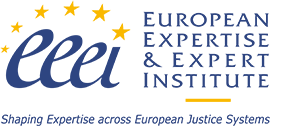The Hague, 7 june 2019
Annual General Meeting
The ordinary general assembly of the EEEI was held on 7 June in The Hague in the superb premises of the Council of State thanks to the kindness of its President, Mr Bart Jan Van Ettekoven, and was preceded and followed by a remarkable cultural and festive programme, including a visit to Delft, which demonstrated, if necessary, the exceptional sense of organisation and hospitality of STAB and its President Sascha Dalen Gilhuijs as well as Nico Keijser.
After the welcoming address and the remarks of the President of the Council of State who presented us the organisation of the expert reports in Holland, Beatrice Deshayes and Etienne Claes delivered to the 80 members of the assembly the report describing the activity of the EEEI in 2018, which was articulated between relations with the various European institutions, the implementation of the Find an Expert project (JUST-AG-20166 n° GA 766374), the development of training activities within the framework of the partnership with the French National Council of Bars, the Paris Bar Association and the French National School of Judges, the statistical analysis work within the framework of a closer collaboration with the CEPEJ.
The financial report presented on the accounting data provided by Jacques Melin once again highlighted the contrast between the size of the sums managed in the context of the projects co-financed with the European Commission and the narrowness of the Institute’s operating budget, whose resources must be increased by developing income-generating activities such as training activities which, initiated in France with the Bar, are intended to develop in other European countries and other professions and by increasing the number of contributors.
In this respect, reference was made to the arguments that should encourage potential candidates to join the Institute: participation in the work of harmonisation, access to information on expertise and its development in Europe, access to a European network made up of representatives of all those involved in expertise (judges, lawyers, experts) who can provide assistance in setting up expertise in another Member State and appointing an expert, possible use of the status of EEEI member provided that they respect its ethics.
After a reminder of the structure of the EEEI and the adoption of the provisional budget for 2019, the co-chairs presented the objectives for the future financial year: completion of the Find an Expert project, development of communication on the Institute’s activity, recruitment of new institutional and individual members, initiation of collaborations with the various Ministries of Justice, creation of new partnerships and finally application for the EERE project: European Electronic Registers of Experts co-funded by the European Commission. The latter project aims to create an electronic register of experts in the European Union and differs from the Find an Expert project in that this time it aims to establish a common nomenclature for all experts or at least to establish correspondences between the nomenclatures used in the different Member States.
With 147 members, including 47 institutional members from 11 Member States, the Institute, which also works with 73 institutions representing 16 countries, was pleased to welcome 21 new members during the General Assembly, including 1 Italian (Michele Canalini), 2 Dutch, 1 Romanian, 1 Ukrainian, 1 Moroccan, 1 Belgian, 1 German and 1 United Kingdom national.
Finally, the new members of Comex were elected, including three, Béatrice Deshayes, Claude Duvernoy and Jacques Lauvin, who were being re-elected, while seven new members were appointed for the first time: Mihaela Aghenitei, Christiane Lenz, Roch Menes, Martine Otter, Eduardo Maria Piccirilli, Richard Porter and Florence Rochelemagne.
Congratulations to the newly elected.
Extraordinary General Meeting
The extraordinary general meeting that followed the general meeting made amendments to the statutes, in particular by developing and specifying the purpose of the EEEI in order to better highlight the mission of general interest in which it has engaged and by requiring its members to respect and promote the ethical rules as set out in the draft code of ethics drawn up on the occasion of the EGLE project.
Presentations
Following these two general assemblies, two presentations particularly drew the attention of the audience:

The first, by René Diekstra, psychologist and author of a book on “biases” that made the audience smile by brilliantly and humorously describing how our brains work and how they can be manipulated through seemingly innocuous subterfuges that generally we don’t pay attention to. For example, changing the order of the adjectives used to describe a person is enough to change our opinion of them in a negative or positive way.

The second presentation was given by Christiane Lenz (German qualified lawyer). Christiane Lenz reaffirmed that, in spite of the possibility to include jurisdiction clauses in cross-border contracts, it is important to harmonize legal standards of expert proceedings in the European Union. Currently, Art. 35 of the Brussels Ia Regulation (EU 1215/2012) provides for the possibility of application for provisional measures (which include pre-trial expert proceedings under French law) to the courts of a Member State even if the courts of another Member State have jurisdiction as to the substance of the matter. This leads to the question whether a German court, competent on the merits, can base its judgement on an expert opinion given during French pre-trial proceedings. (In the reverse situation, e.g. if a French court seeks to base its judgement on an expert opinion given under German law, the same question arises, in particular because of the differences between German and French law regarding the adversary principle.)
by Alain Nuée, June 2019
Information
Address: The Hague, La Haye, Pays-Bas Council of state
Date: 7 June 2019






